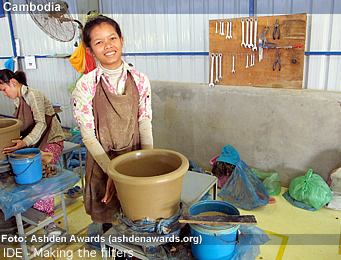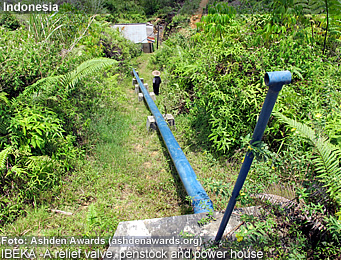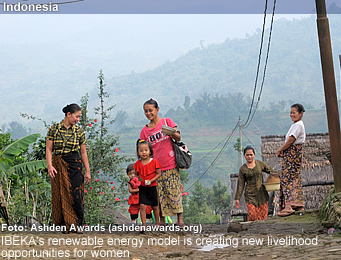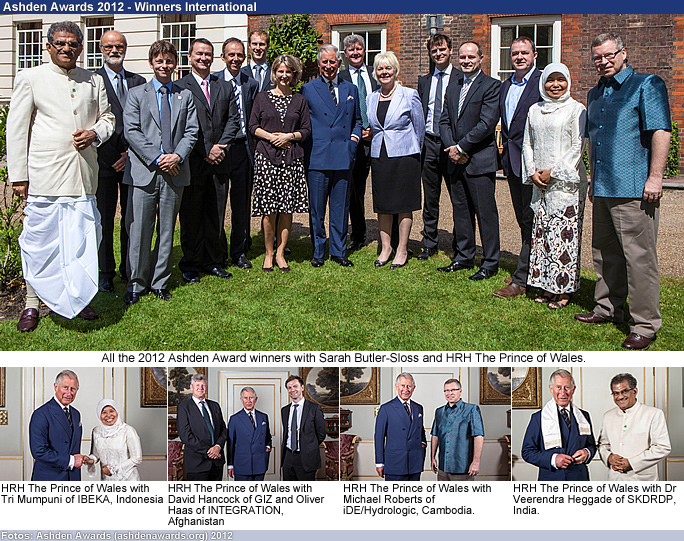| ASIEN |
| Cambodia - India - Indonesia |
 |
 Ashden Awards Projekte für nachhaltige Entwicklung Ashden Awards Projekte für nachhaltige Entwicklung |
|
 |
Entwicklung Informationen |
|
| Ashden Awards - "Global Green Award" |
 |
|
Cambodia - India - Indonesia
|
 |
Winners of the world's leading green energy prize were announced tonight at a prestigious ceremony at the London-based Royal Geographical Society, addressed by Dr. Kandeh Yumkella, Director General of UNIDO and Chair of UN-Energy, a global crusader for increasing access to energy for the poor.
The five winners have been awarded a total of £120,000 to help them scale up their work. They are: a community-owned micro-hydro programme in Indonesia (IBEKA); a micro-hydro programme in remote Afghanistan (GIZ/INTEGRATION), a microfinance provider in rural India that helps poor people invest in renewable energy (SKDRDP), an energy-saving water filter in Cambodia (iDE/Hydrologic) and an affordable solar power provider (Barefoot Power) that's lighting up lives in East Africa.
This year's overall Gold Award winner is South India-based is the Shri Kshethra Dharmasthala Rural Development Project (SKDRDP), which impressed the judges for demonstrating the key role a microfinance organization can play in meeting the poor's energy needs.
The Ashden judges said: "SKDRDP is fantastic example of how ethically managed microfinance can deliver sustainable energy to the poor, demonstrating that providing consumer loans for energy makessound social, environmental and economic sense. We were bowled over by the scale SKDRDP has achieved so far, along with the responsibility it takes for lending to the poor, nurturing users to take out effective loans. SKDRDP has huge potential to expand its work even further, and to inspire many others to follow its lead."
In his keynote speech, Dr. Kandeh Yumkella urged governments around the world to increase their support for clean energy pioneers: "The Ashden 2012 winners are exposing the myth that poor countries cannot stimulate growth without degrading the environment. They are demonstrating that sustainable energy stimulates green growth and new jobs, lifts people out of poverty, improves health and opens up new educational opportunities.
"The decisions that will be taken at Rio in June will carry consequences for generations to come. Governments around the world must act urgently to agree the right policies and investment incentives that nurture these and other sustainable energy champions, before it's too late."
Sarah Butler-Sloss, Founder Director of Ashden said: "In this uncertain world our winners offer a beacon of hope, showing that access to sustainable energy offers a clear route out of poverty for millions of people around the world. We're committed to sharing the lessons they have learned so they can be replicated far and wide."
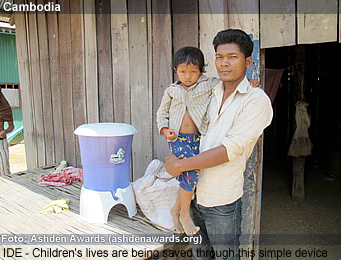
|
|
The NGO iDE and its for-profit subsidiary Hydrologic Social Enterprise's energy-saving ceramic water filters mean rural families have safe drinking water without using wood to boil it - so protecting health as well as Cambodia's precious forests. With over 226,000 affordable filters sold so far via NGO programmes, shops and rural sales agents, 90,000 are currently use, benefitting some 420,000 people. The impact on the environment is equally impressive: with each filter saving over half a tonne of wood over its two-year lifetime, so far 41,000 tonnes of CO2 emissions are currently being saved every year.
|
|
Thuy Nuy, who has bought a water filter using finance that the iDE also provides, says: "Finance is very important to me - without it, it is very difficult to purchase the water filter. It's not difficult to repay the money, it's less than $5/month."
Michael Roberts, Country Director
E: mroberts@ide-cambodia.org
 |
|
Off-grid hydro schemes are bringing the benefits of electricity - like good quality light, TV and power tools - for the first time to remote communities in Indonesia, creating new livelihood opportunities and a window on the wider world. The not-for-profit People Centred Economic and Business Institute (IBEKA) is responsible for developing the schemes, which are owned and managed by communities. IBEKA also develops on-grid schemes, which provide an income to communities from selling electricity to the grid.
|
|
With 61 hydro schemes installed so far, 54,000 people currently benefit and 7,400 tonnes of CO2 a year are being saved.
Says Aki EngKok, Village Elder in Ciptagelar: "After coming back from the rice field in the dark in the evening, we don't need to find kerosene - now the lights just come on. And although we are in the mountains we can get information about what's happening on the other side of the world."
Tri Mpuni, IBEKA's Executive Director said: "I told them I'm a woman. I can wait as long as I get what I want. And I want the government to agree on our proposal [to sell electricity back to the grid]".
Contact:
Tri Mumpuni, Executive Director
E: tri.mumpuni@gmail.com
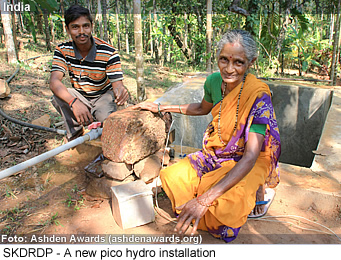 |
|
Shri Kshethra Dharmasthala Rural Development Project (SKDRDP) in South India is a prime example of the vital role a well-run microfinance organisation can play in meeting the poor's energy needs. The Karnataka-based NGO provides affordable loans to families in the area, helping them buy renewable energy systems that improve their quality of life.Key to the success of this highly replicable programme, which has so far provided nearly 20,000 energy loans, are 169,000 self-help groups that help people make informed choices on what energy products they buy.
|
|
Said Hanastra Vasanthi: "Now my cooking is done much more quickly and I can spend more time with my children, helping them with their studies."
Contact:
Dr. D. Veerendra Heggade
President, SKDRDP
E: dvheggade@gmail.com
| Source:
Ashden Awards, 2012 |

|
| Weitere Informationen |
 |
 |
| Afghanistan und Indischer Subkontinent |
|
 |
| RAOnline: Weitere Informationen über Länder |
| Links |
 |
 |
 |
Externe
Links |
|

